 Loud Sistah
Loud Sistah
Loud Sistah
Self-Produced
Loud Sistah have just come onto the scene, making a lot of noise in the process. But the band has a genuine pedigree to warrant the media attention; and enough chops, versatility and chutzpah to deserve your attention as well.
It’s been a while since the highly touted reggae band, Dub Squad disbanded. But several members have moved on to form Loud Sistah. Vocalist/keyboardist Karen Searcy, vocalist/saxist/ keyboardist Mary Sue Tobin and saxist/keyboardist/vocalist Melanie Kubik form the crux of the new band, which only slightly bears any resemblance to Dub Squad. In addition to the occasional reggae number, Loud Sistah add large dollops of hip-hop and funk to the mixture, producing fun, exciting results.
Check out the incessant skittering rhythm of “Loud Sistah Rap,” or the more metalized aspects of “Git Down Tonight.” Tobin has one of the weirdest rap voices you’ll ever hear. On “Love Gone Wrong,” her voice cracks and breaks, awkwardly, but a foggily mystical chorus and the earnestness of her delivery help to overcome any shortcomings.
Searcy is by far the stronger vocalist, lending her silky, dusky voice to the satirical reggae tune “Weekend Rasta,” a tune that is colored by tasty horn interjections, a seering guitar solo by Ryan Waters and Kubik’s rousing sax solo at the end.
Tobin contributes her endearing creaky voice to the clever and funny reggae/blues number “Pocket For The One.” ” Tell me now, tell me how, you came to the conclusion/ that the shoes that I’m wearin’ is really me and not illusion.” Ah, don’t you just love metaphysical questions in the middle of yer buttshakin’ quest for the perfect party? I know I do.
That’s one of Loud Sistah’s big assets: they’re awfully smart. Much of their material, especially Tobin’s, dances in the realm of bebop jazz/beat poetry— with a sense of higher consciousness alien to ninety-five percent of their audience. Fortunately, the bands’ astute musicianship and presentation help to obscure that fact, preventing the disease that frightens people more than AIDS or Ebola—thought. For further elucidation, consult the forthright diatribe registered by Ms. Tobin on “You’re Gonna Miss Me.” An inventive little horn section bubbles up in the middle, diverting attention from the rap, as Kubik contributes a compelling sax solo.
Drummer Eduardo Esparza and percussionist Brian Davis kick off “American Dreams” with a middle eastern flavor, Water’s slinks in on guitar. Sharing the vocal duties, Searcy and Tobin launch into a heated socio-political tirade while Yatti Durant wails forlornly on the trumpet. All this, and a chorus that somehow recalls the sea chanty “What Do You Do With A Drunken Sailor.” Eegad! It is a sound unheard in Portland before the advent of Loud Sistah.
And then they can turn around and give you a soul flavored, big-beat ballad like “Crazy Mary,” that is more autobiographical than they might really let on.Or they can throw the gospel flavored “Do What You Can Do” at you. This is a hit song— with Searcy huskily intoning the lyrics while Tobin and Kubik provide stellar harmonies in the gorgeous chorus. This is the song that is the most radio friendly among their repertoire. Yet if one were to judge Loud Sistah by this song alone, he would be like a blindman comparing an elephant to a snake, by feeling only its tail.
Truly, Loud Sistah are a live experience. Karen and Mary Sue’s stage patter is not to be missed— witty, self-deprecating and charming. The same could be said for this versatile eight-piece outfit. They know how to have a good time and the audience can be included, if they want to be. It’s always great to have a good new band on the scene and Loud Sistah is one of the best.
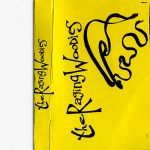 Raging Woodies
Raging Woodies
Raging Woodies
Self-Produced
About every eighteen to twenty four months, there is a band turnover in the local music scene. Of course this exchange is taking place constantly. But after a year and a half, the change becomes obvious. The bands on top, yer Ponds and Everclears, either move up to the next rung on the ladder of suck-cess, or they fall off the ladder altogether and break up. Either way, new bands rise up and fill in the ranks. Some. like the Dandy Warhols, seem to spring up from nowhere. Others, like the Raging Woodies, simply come up through the ranks. That’s how it’s done. Raging Woodies, remember the name. It’s a hard one to forget, so to speak. Ahem. Anyway remember their name, because in six months or so, they will be yer new local starz. It’s as inevitable as a tree.
The Woodies are a vibrant three piece headed by vocalist, acoustic guitarist Jeff Groves. Jeff has one of those husky baritones that seem made for rock and roll. Joe Cocker had it. Bruce Springsteen had it. Jef Groves has it. Combine that voice with a strong sensibility for delivery and saavy songwriting ability— and you have yourself The Woodies are a vibrant three-, Elvis Costello has it.fsavvya vital frontman. Toss in the talented and able efforts of bassist Don Corey and drummer Todd Bishop and you have yourself a solid band with a bright future. That’s the Raging Woodies.
You can hear it in “Jonesin’.” An infectious sound combining Groves’ jangling acoustic guitar and Bishop’s awesome drums sets the mood, as Jeff uncurls his raspy voice around a song that, though it is not easy to perceive, has it’s antecedants in Boy George’s “I’ll Tumble For Ya.” Because the music sounds so stylistically different, it’s possible that the Woodies would be aghast by that thought.
“In Your Eye” starts off as a piece of hyperbluegrass which Groves performs exquisitely on guitar, before the song simply explodes into a furious verse. Anyone familiar with the seminal LA ’60s punk band, Love, will appreciate what the Woodies purvey. But the Woodies’ is a new sound. Bishop proves himself an absolute drum monster on this track as well. And Corey plays the bass seam between guitar and drums so tightly so as to nearly reach sonic invisibility. That is a huge compliment by the way.
Groves proves himself to be a formidable flatpicker. The intro to “Get Your Gun” is a succinct example of the style. Corey, picks up the feel on bass, with a smart, strutting funk bass figure. And then Groves is off to the races. This is the sound of hit band folks. Raw emotion squeezed through a deliciously tormented throat for an unforgettable chorus. Great stuff.
It’s hard to believe that there is anyone on the face of the planet that wouldn’t simply go crazy for this band. Chops, rage, melody, nuance, invention and heart. It’s a potent combination. And that’s the Raging Woodies— everything you could ever want in a rock band.
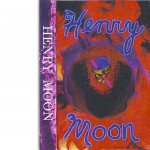 Henry Moon
Henry Moon
Henry Moon
Self-Produced
Stylistically, Henry Moon have a lot in common with the Woodies. The Moons play power acoustic rock, the fulcum of which is the granite-like foundation of a solid drummer.
Here, the drummer is Dennis Elmer, who has distinguished himself through the years as one of Portland’s best ideosyncratic drummers. Here, he and marvelous bassist Erik Hilden support the arcane musings of acoustic guitarist/vocalist Tom Wells.
Henry Moon are harder to peg. Their music is more eclectic. As if Violent Femmes and King Crimson decided to talk voodoo with Jonathan Richman. You know— weird. But a very cool sound all the same. Technically impeccable.
Those elements all fall neatly into place ion “The Night They Didn’t Go To The Horror Picture Show.” It’s a dark, moody number with stuttering arpeggiated acoustic guitar runs flowing over a restless rhythm section. Vocally, Wells begins in a low muttering moan in the verses before escalating to a higher register in the chorus. The jarring transitional passage rivals even Caveman Shoestore for technical virtuosity, before ducking back into the relentless overdrive of the initial riff.
Wells goes electric for “Gun Shy,” giving the band a definite grunge texture that went disguised in the preceding cut. Wells sings this folk flavored song in an English style recalling Bert Jansch of Pentangle or Michael Stipe for those of you with no sense of history. The choruses however, veer dangerously close to Adrian Belew turf. The bands’ execution is exemplary, even when spiraling wildly out of orbit.
The intro of “On My Mind,” is an opportunity for Hilden to showcase a few of his myriad talents on the bass, before the tune sways toward a gentle country twinged feel. Atypically, this cut is pretty straight ahead. Wells contributes some well-wrought Neil Youngish electric guitar solos all along the way. A cool cut.
As if to prove the accuracy of the sentiments put forth in the previous paragraph, the Moons steer into more turbulent waters with “‘merikan Cream.” Wells submits a jagged, schizoid vocal over a chunky electric guitar riff álà Red Hot Chili Peppers. The result is a forceful piece that grabs your attentionrlike a hand across the throat— unrelenting in its gripping intensity.
Henry Moon have a lot to offer the well-prepared listener. It’s hard to get a fix on where they mean to come from, but the places they go are seldom traveled, and rarely better mapped.
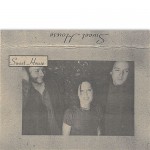 Sweet House
Sweet House
Sweet House
Self Produced
Here is yet another band you’re going to hear a lot more from in the coming years. Sweet House has its roots in a band once known as the Soul Junkies. If you are at all familiar with that band then you might remember one Ms. Susan Blue— a diminutive presence under almost any circumstance. Unless you put her behind a microphone. Suddenly she becomes three time her normal size, filling a room with her enormous vocal prowess.,
With a rich, husky contralto, along the lines of Melissa Manchester or Linda Perry of the now defunct 4 Non-Blondes, keyboardist Susan blasts her way through the challenging rocker “Lovers And Killers,” while her faithful sidekicks Andrew Martin on bass and Andy Burley on guitar provide splendid support. Burley’s solo in the break is a thing of restrained beauty, recalling the best work of Duane Allman. And Martin’s bass runs through the extended coda are a finely woven brocade.
The band turns funky on “Beautiful People, Beautiful World,” as Martin supplies a supple filigree on bass and Burley contributes a wanking wah-wah, Jimi inflected fills. Meanwhile, Susan chews up all available musical scenery— resolving in some brief, yet remarkable scat riffs.
Susan’s electric piano creates the thematic framework for “Crazy Sally,” a tune that hinges on her exquisite interpretations of the choruses. Her spiraling upper register swoops around the melody with the facility of a falcon. Burley uncorks a snarling guitar solo in the break, hammering across the descending chromatic run that drives the song.
“Slip Your Skin,” appropriates the intro to the Stones’ “Monkey Man,” to great effect, before dropping into a reggae tinged feel in the verses. Primarily the song serves as another vehicle for Susan to display her abundant vocal gifts. Burley’s riffage against the vocals calls to mind Clapton (in the days Cream days, when he actuallly had something musical to say) and Jimi (when he was alive to say it).
Sweet House are a talented young band with an abundance of potential. Currently they are looking for the right drummer to fit into their musical family. Ads placed in the usual classifieds sections have cruelly misprinted their number. If you are a drummer and would like to contact Sweet House for the opportunity to tryout for one of Portland’s most exciting unknown bands, call them at 231-6396. They are a quality band deserving of a quality drummer.
 Mech
Mech
Mech
Self-Produced
Mech are still another band newly arrived onto the scene. They play muscular grunge with a certain entusiastic if somewhat predictable passion.
The band is beyond competent. Lead guitarist Matt Messing develops several original sounding themes in the course eleven song venture.
Messing and lead vocalist/rhythmn guitarist Sean Clark set the mood on “What Was I Thinkin’.” Clark has a robust voice, honed in the ways of the mighty Seattle chieftains— Vedder, Cornell and Staley. Drummer J.R. Ericksen propels “No LIght,” throttling his bass drum as if he were stamping out a carpet fire; smacking the snare as if it were an impact resistant. Messing provides the guitar pyrotechnics while Clark does his best David Lee Roth impression. The rest of the band sound not unlike Van Halen for what’s left of the millenium. Out, out brief candle.
“Don’t Go” finds the band exhibiting formative power pop sensibilities, exploring that old IV-I-V chorus mine, seeking yet one more nugget from the as yet unexhausted vein. The band again manifest the ghost of Van Halen, for better or worse. “Too Much Woman” finds Messing messing seriously through a tasty solo. And “Inner Soul” evinces qualities that band could seize upon when they decide to progress to the next plateau; evoking a riff that echoes back to 70’s dinos like Blind Faith, Jethro Tull and Black Sabbath.
“Victim” also rises above the mundane with a ballsy guitar salvo. Clark divests himself of a couple distinct mannerisms that often seem habitual, to sound a bit more straightforward in his presentation. Similarly, the lyrics here seem more developed than in other instances— a propensity to be greatly encouraged. Lead guitarist Messing runs through a series of sterling solos that demonstrate truly amazing dexterity and speed faster than ears can here. Hey! More of this guys.
“Butterfly” also shows a lot of promise, though I would urge Clark to work on the habit he has of sliding into the final note of a melody line. Ozzie and David Lee have pretty much staked out that turf. Currently no vacancies. Perhaps imitation is the sincerest form of flattery, but it can only get you so far in the business of music. It would seem Mech are destined for better things than that pigeon hole.
Take Messing’s generous appropriation of Peter Green’s classic riff from Fleetwood Mac’s early classic “Oh Well,” on the arresting “Reality.” He refers to the original without imitating it. That probably seems like a fine line, but one worth developing all the same.
Mech exude raw talent. Their execution is a thing to be reckoned with. But for the most part, their material is not up to the level of their musicianship. If the band can shed a tendency towards excessiveness (though often well-wrought), by focussing on the development of a sound of their own, they would seem to have a bright future.
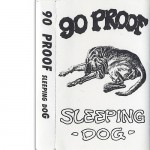 90 Proof
90 Proof
Sleeping Dog
Self-Produced
90 Proof have acquired a certain notoriety around town. Little of it has been for their music— which is basically hard, tight and fast. Save nuance for the others, these guys cut to the chase.’
“Broken” blows up like a can of gasoline, fiery and brief. Vocalist/ Guitarist Jason sings as if he had a mouthful of that gasoline when the can blew up, but he gets his point (which would seem to be about his essential lack of self-esteem in a valueless society) with alacrity— which is the better part of propriety in my book. “Driver” picks up where “Broken,” left off only in a different key, and a little faster. Drummer Bill, bassist Fig and second guitarist Mike provide a specific gravity to the song of about 10 Gs. A strong hook and the restless indominability of the pace serve as the backdrop for two scorching guitar solos.
“Deluxe” maintains the incessant jackboot two-beat. Jason is another guy with a classic rock voice finds antecedants going back to Screamin’ Jay Hawkins in the ’50s and Arthur Lee and Sean Bonniwell in the ’60s.Although the tempos here are four times as fast for our accelerated society.
“I Wanna Give,” chews up its minute and a half with monstrous vigor and monumental swaggering authority. “Life I Lead,” breaks up the hammering one-three drum accents for a change. Here, Bill comes in at two and four which sounds almost cosmic, given the scenario. But on “Try To Tell Me,” he reverts to form although dressing up the charge here with a desperately flitting kick.ith a desperately flitting kick barrage.
The Proofsters reach their apogee with “Tommorow,” a molten rivet to the brain. Josh viciously snarls the vocal against the elastic two chords of the verse and the other two rubbery chords of the chorus. An eight-bar solo and get the hell out of the way. “No Solutions” of course offers just that, but manages to stir up a stormy turbulence in the passing.
I’m not sure what message 90 Proof mean to convey, though it seems obvious that it’s somewhat less than cheery. For the disenfranchised among you, this would certainly seem to be the sort of thing you could bloody well bloody yerselves over. If that sounds like your kind of Friday night, there is little doubt that 90 Proof have the chops to put you right therein the middle of it.
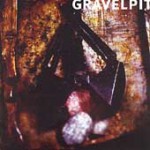 Gravelpit
Gravelpit
Mountain
Schizophonic Records
Perhaps one of the most gratifying aspects in being a longtime observer of the Portland music scene is to be availed of the opportunity to watch a band grow and develop. This metamorphosis is extremely rare among our local musical caterpillars. Most bands break up long before they reach the butterfly stage.
But if you want an example of this sort of transformation in action, you need look no further than Gravelpit. For with this nifty recording, they have proven themselves to be a fully formed Monarch of a rock band.
About two years ago, the band released a well-recorded venture entitled Noodles. Check out the title cut from that effort and compare it to its reincarnated version on Mountain. In that comparison you can hear the evolution of a band. Listen to how guitarist Grant Cumpston, bassist Johnny Huck and drummer Marc Vatter have solidified the cool skip/retard dropkick lurch of the guitar riff.
Cumpston deserves special mention from the outset. His development into a great guitar player has been as sure as the flight of an arrow. He now wastes no notes, not a single strum on the strings. His versatility and taste are at all times impeccable. And, seamlessly tied to Huck and Vatter in the rhythm section, all three musicians display a fabulous sense of dynamics; of control; of tension and release. Each song has its own signature sound and texture— unique, yet cohesively produced. This is, by far, producer Drew Canulette’s finest work— since his Dogfish Studios burned down. His mastery of Musicraft Studios, here lends Gravelpit a definitive “big league” sound.
Vocalist Steve Wilkinson has become proficient at the craft of singing. Contrast his soft, sensitive delivery on “Mountain” to the growling snarl of “Spin Lizzy.” It’s hard to believe it’s the same guy performing both songs. His voice has acquired the qualities of emotion and passion, which he has learned to call forth on command, effortlessly.
Each of the eleven cuts is a gem. Each has its own distinct coloration and dimension. “Never” hangs on Cumpston’s recycled Zep riff and Steve’s gritty vocal. Grant’s raucous eight-bar solo in the middle tears up the turf, leaving skid marks all over the musical scenery. The remake of “Noodles” is clearly a hit. Cumpston’s slashing guitar theme recalls the fine work of Vinnie Zummo during Joe Jackson’s mid-’80s Big World period. Ethereal, complex background vocals by Huck and Cumpston, support Wilkinson in the bridges, with ghostly effectiveness.
The remake of last year’s “Mountain,” is denser, the guitars thicker. Cumpston’s “Pictures Of Matchstick Men” riff soars into the stratosphere in the choruses, as a sustained swirling feedback tone hovers intangibly above the searing chord progression.
Vatter’s smart drumming drives “Dirge,” while Huck and Cumpston weld a rigid musical framework. Steve sings in barely a whisper through two verses before exploding into powerful screams in the chorus. As inevitably as the sun rises, Cumpston supplies a bright chiming solo, calling to mind Peter Buck’s best work. “Grind” combines a tough, galloping rhythm with a strong hook of a chorus, harkening back to all the classic rock music of the past three decades.
“3-A’s” works off of a “Don’t Fear The Reaper” drone phrase, developing slowly, picking up tension as the song progresses. Clever vocal harmonies create a deep sense of mood. Cumpston provides yet another gutsy, full-bodied solo in the break. Vaporous backward guitar blows through “Anchor,” as Huck provides the forward motivation, wresting a hard edged punch across Vatter’s happy, dancing rhythm. Steve performs the Stipe on vocals, mumbling in a warm, nasal drawl over the classic chord formations of the chorus.
Huck kicks off “I Don’t Know,” with a neat bass turn, as Cumpston chimes in with subtle guitar filigrees. The song builds to an intense chorus, relents, and builds again. Grant wrenches a turbulent counter theme in the chorus, while Steve erupts from the soft mood of the verse into total volatility. Grant’s understated, wailing two-string figure at the end, intimates Jimmy Page’s majestic coda on “Stairway To Heaven,” without sounding at all imitative.
The definitive hit of the litter is “Kiss,” with a swaggering Urge Overkill feel to die for. Check out the rhythmic hopscotch of Wilkinson’s vocal over the crunchy chord progression Huck and Cumpston lay down. Cumpston’s sizzling solo evokes the finest work of George Harrison or Eliot Easton of the Cars, two guitarists who always played well-conceived, well-wrought leads.
Another sure fire crowd pleaser, the jukebox smashing, cue-stick cracking barroom brawl of a tune “Spin Lizzy,” burns with savage intensity. Steve’s raw, ballsy vocals propel the song into a drunken, streetfighting musical alley. It doesn’t get any better than this.
Without a doubt, Mountain will stand as one of the finest albums ever to come out of the Portland rock scene. There is not a bad cut in the lot. Each song is unique unto itself, and yet cohesive to the whole. Vocalist Steve Wilkinson consistently proves himself to be the most charismatic vocalist the city has seen since Jeremy Wilson fronted the Dharma Bums. Grant Cumpston’s inspired guitar work, deftly supported by John Huck and Marc Vatter in the rhythm section, lend Gravelpit a distinctive sound all their own. Their material sounds instantly familiar, yet cleverly original at all times. It’s national. Totally national.
